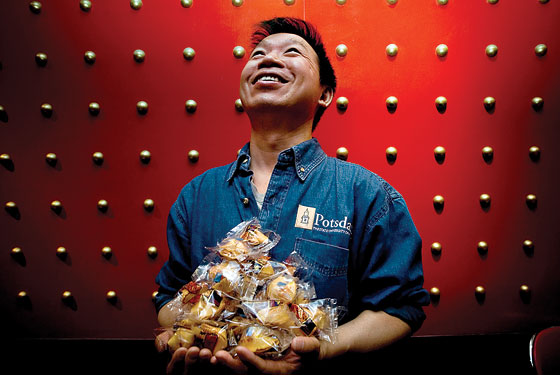
You might not know it, but this is a precarious time in the Chinese-restaurant world—at least according to Xiaotu (John) Zhang, the force behind the proliferating Grand Sichuan empire (he owns or co-owns five out of eight branches, including a new one in Jersey City and a snazzy Greenwich Village outpost opening later this month). Part businessman, part culinary scholar, Zhang expounds on his plans to yank one of the world’s great cuisines into this century—beginning with the beef with broccoli.
You’re from Shanghai. How did you become a Sichuan expert?
When Wu Liang Ye came to New York in 1993, they offered me a job, so I started learning Sichuan and Hunan food. Personally, I don’t eat too much spicy.
How dire is the Chinese-food “crisis”?
Since 2002, Restaurant magazine has put out a list of the best 50 restaurants in the world, but not many Chinese restaurants are included. Chinese cooking is lagging behind.
What’s wrong with it?
The “three steps of cooking” applied by most Chinese restaurants in America, and even in mainland China, are wrong: marinating and “beating water” into meats, frying meats through oil, and “wrapping” sauces over meats in a wok. In this way, chefs can cook very fast, but the cooking is the same, which is why there are so many dishes.
Why is there no such thing as a Chinese celebrity chef?
Chinese menus are more or less the same; the chefs can be replaced easily and the owners control restaurants. In Western countries, the best restaurants are always small, but in China, the best restaurants are huge (usually more than 1,000 seats). The best chefs have no chance to cook, just manage, and the chef’s function and role have been distorted and delimited.
How do you find chefs who meet your standards?
I don’t cook, but I watch chefs cook a lot, and read cookbooks to understand Eastern and Western cooking. I think a lot to find new ideas and methods, and then ask chefs to test them. In China, using MSG has been written into textbooks; now I ask them to abandon MSG and use broth.
Why can’t there be a great, multi-star Chinese restaurant in New York?
As Obama said, we do need a change. Since Chinese cooking originated from the agricultural society, it is “undeveloped.” We need a “reform and opening” policy, like the Chinese economy, to introduce new techniques and ingredients.
But if it’s not traditional, can it be authentic?
Authentic does not mean good. Some authentic is bad. Too salty, too oily, too spicy. Healthy—that’s good.
What are some examples of the “new Sichuan cuisine?”
Beef with broccoli is an old dish, but we prepare it differently—first boiling the beef, then cutting and cooking it. We will have a pumpkin-seed-and-goji soup; both ingredients are on the top-ten list of health foods in America.
Which Chinatown has the best food?
Flushing, where people from northern China and Taiwan are dominant. Cantonese are dominant in Manhattan, which is declining due to limited space. Fujianese are dominant in Brooklyn Chinatown, but their food is simple.
What do you think of New York’s “fancy” Chinese restaurants?
I really loved 66, and I love Buddakan. They pointed out the future development of Chinese cooking.
What’s your favorite kind of food?
French and Italian. In China, I really love Kentucky Fried Chicken, which is almost totally different from those in America.
Do you ever order delivery?
Almost never.
Grand Sichuan is scheduled to open by the end of May at 15 Seventh Ave. S., nr. Leroy St.; 212-645-0222.